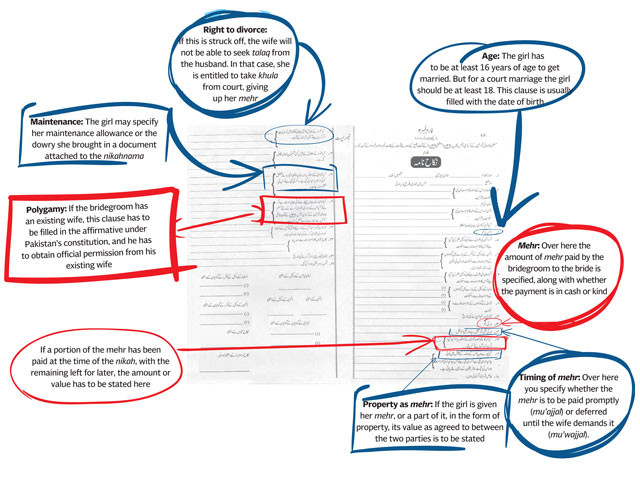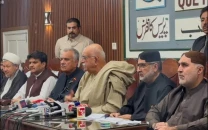What you need to know about the nikahnama
If you are like most brides, you will see the nikahnama only when you’re signing the dotted line.

What you need to know about the nikahnama
You’ve booked the venue, arranged for the caterer, and picked out your make up artist. The invitations have been delivered, the dance moves perfected by your cousins and friends. It seems that you are perfectly prepped for the biggest day of your life. But have you even glanced at the document which will actually seal the deal? If you are like most brides, you will see the nikahnama only when you’re signing the dotted line, with relatives hovering over you and guests waiting impatiently for the dinner to be served.
But, like I said, this piece of paper – and not all the elaborate arrangements you’ve made – may well determine the course of your married life. How many times have you heard of a marriage hitting the rocks because the couple was at odds over financial issues or found out that they were simply incompatible? A good understanding of the nikahnama can help a girl get her rights in such scenarios – and by forcing her to think of these serious issues prior to marriage, it actually works to circumvent unpleasantness later on. When deliberating over the different clauses of the nikahnama, husband and wife have the chance to spell out their expectations to each other, leading to a happier married life.
However what usually happens is that the bride-to-be plans a fairytale wedding with little other than a happily-ever-after situation in mind. Then, when issues crop up later on – as they inevitably do in any marriage – the girl finds herself unprepared to handle them, more often than not. In the not-too-rare situation that husband and wife have irreconcilable differences, the wife may find herself at a distinct disadvantage. After all, it was the moulvi solemnising the nikah who filled out the nikahnama; the girl had hardly looked at the document before signing it.
It’s hard to overstate the importance of this seemingly simple two-page document that requires as little as the testimony of two witnesses and the consent of the couple. At the very least, the nikahnama deserves some contemplation on your part, and an effort to gain a basic understanding of what all the clauses it contains entail.
There are clauses you might not be aware of, that your moulvi would be tempted to cross out because he deems them irrelevant or contrary to tradition. But take note that they are provided by the law and designed to give you certain marital rights. No matter how strong an understanding there is between the couple and their families before marriage, the straightforward, business-like nikahnama preempts possible future misunderstandings and ensures a degree of constancy in an otherwise emotional affair. If relations get messy, that piece of paper will be one of the most important documents that the embittered couple submit to court.
One of the most important clauses in the document that you should be aware of is the one stipulating the haq mehr – an obligatory gift given to the wife by the husband in consideration of marriage. When filling out the nikahnama, make sure you specify the form in which the mehr will be paid: it could be in the form of cash, gold, or any other item of value. If gold worth a certain amount is specified, the wife automatically claims gold of that worth from her bari (gifts from the groom’s family) as her own. Unless the mehr is specifically stipulated in the nikahnama, the gold given by the man’s side is considered to be gifts in a court of law which have to be given up in case of a divorce.
While the issue of mehr is often settled by the elders of the two families, there is no harm in women expressing their desire to ask for ‘mu’ajjal’ (when the mehr is to be paid at the time of the nikah), or ‘mu’wajjal’ (when it is to be paid at the time the wife demands). However, if the clause about mehr is left empty, the wife may have to make do with an amount set arbitrarily by the husband.
Here is the catch though: if the mehr clause is left empty, the wife can actually challenge the husband in court, stating that he has not fulfilled his obligation. The burden of proof then falls on the husband and he will have to show that he has in fact paid up the mehr. For this, he would have to produce evidence regarding the form of payment and produce witnesses to testify that he made the payment.
The most abused clause in the nikahnama – which, by the way, is routinely crossed out by moulvis without so much as consulting the bride – is the one stating the right of a woman to initiate divorce. If this clause is struck off, you lose the ability to file for Suit of Dissolution of Marriage by Way of Talaq. You may still file for khula which means that you lose the right over your mehr. While khula gives you the benefit of not needing to record evidence against the husband, it places you at a financial disadvantage and for many women giving up that financial security effectively means forgoing divorce. You need to decide whether you want to retain the clause which would entitle you to receive your mehr in case you ever need to initiate a divorce.
There are clauses and documents you can even attach to the nikahnama. You may set an amount of money that you want from your husband as allowance every month. This could be any amount decided between you and your prospective husband. Interestingly, the girl may challenge in court years down the line that the allowance spelled out in the nikahnama is not sufficient to meet her expenses and be revised keeping in mind inflation and her growing needs. Some people go as far as to include a clause that in the case of a separation or divorce the husband will pay her a certain sum of money, or a clause regarding who is going to get the custody of children if there is a breakup. So long as the documents do not run contrary to law, such clauses are acceptable in the court.
The nikahnama is one of the few things that are left to the last minute, when there is hardly enough time for the girl to deliberate over it - even though it is the one document that ensures your marital rights. Hence, the best advice to would-be brides would be to take charge and read it. Know what rights you have, and ask for what is rightly yours.
Questions Couples Should Ask (Or Wish They Had) Before Marrying
Published in The New York Times, December 17, 2006
1) Have we discussed whether or not to have children, and if the answer is yes, who is going to be the primary care giver?
2) Do we have a clear idea of each other’s financial obligations and goals, and do our ideas about spending and saving mesh?
3) Have we discussed our expectations for how the household will be maintained, and are we in agreement on who will manage the chores?
4) Have we fully disclosed our health histories, both physical and mental?
5) Is my partner affectionate to the degree that I expect?
6) Can we comfortably and openly discuss our sexual needs, preferences and fears?
7) Will there be a television in the bedroom?
8) Do we truly listen to each other and fairly consider one another’s ideas and complaints?
9) Have we reached a clear understanding of each other’s spiritual beliefs and needs, and have we discussed when and how our children will be exposed to religious/moral education?
10) Do we like and respect each other’s friends?
11) Do we value and respect each other’s parents, and is either of us concerned about whether the parents will interfere with the relationship?
12) What does my family do that annoys you?
13) Are there some things that you and I are NOT prepared to give up in the marriage?
14) If one of us were to be offered a career opportunity in a location far from the other’s family, are we prepared to move?
15) Does each of us feel fully confident in the other’s commitment to the marriage and believe that the bond can survive whatever challenges we may face?
Published in The Express Tribune, Ms T, July 8th, 2012.



















COMMENTS
Comments are moderated and generally will be posted if they are on-topic and not abusive.
For more information, please see our Comments FAQ